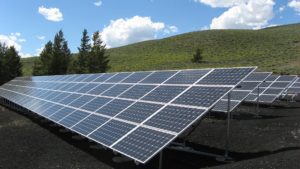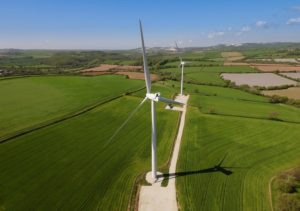
At the beginning of this month we were introduced to the highly anticipated Agriculture Bill 2018. The bill and the need for it, represents what is a difficult time for farmers and landowners.
They will likely be looking wearily at Brexit and the possibility that the current subsidies and benefits that the EU provides will be replaced with a different scheme. As such, different revenue streams and cost cutting measures may need to be implemented upon some farms and battery storage is now becoming an increasingly popular way of doing both of these.
READ MORE: The Agriculture Bill 2018 is here and it’s looking green!
What is battery storage?
Battery storage or energy storage, can be defined as the capture of energy produced at one time for use at a later time. Importantly, the ‘storage’ part of both these terms must be economical and efficient for it to work as an effective business opportunity. Suitable plots for battery storage systems come with a number of ‘unofficial requirements’. These would be; easy grid access with no blockages (roads, rivers, train tracks etc), no flood risk, a secluded location away from dwelling houses and relatively flat land. Of course, this list is not definitive. In terms of size, they may range anywhere from the size of a 40ft shipping container to 2 acres. Because of these requirements this option is only going to be available to certain land owners. Especially important is the requirement to have grid access. Without this, the project is not possible.
Ways in which battery storage creates revenue
 The question everyone is really concerned about, ‘how is this going to make me any money?’ Firstly, battery storage may be an option for those who are already generating their own energy. This is particularly viable for landowners who are generating lots of electricity through solar or wind power. The energy can be effectively stored and then used either when grid prices are at peak or just as needed. Of course, the cost savings are only going to be realised on larger farms where there is a substantial cost to using electricity at peak times. Alternatively, any surplus energy generated can be sold back to the grid when demand is high and prices higher.
The question everyone is really concerned about, ‘how is this going to make me any money?’ Firstly, battery storage may be an option for those who are already generating their own energy. This is particularly viable for landowners who are generating lots of electricity through solar or wind power. The energy can be effectively stored and then used either when grid prices are at peak or just as needed. Of course, the cost savings are only going to be realised on larger farms where there is a substantial cost to using electricity at peak times. Alternatively, any surplus energy generated can be sold back to the grid when demand is high and prices higher.
The other option is where the landowner leases a portion of their land to an energy provider, who will place their own battery storage system on the land. This storage system will provide support to the local grid system. For instance it may back up the grid for the local area when lots of electricity is being consumed or supply energy when there is disruption (severe weather for example). The landowner generates money through granting the lease and the rental income it provides.
General benefits of battery storage
- Firstly, as mentioned above battery systems provide security to the local grid system. This is important as it takes away the reliance upon a centralised power station. If the station goes down, local demand can be fulfilled by a local storage system until the central station is running again.
- The systems are good for the environment. By storing energy and using it later on we are being less waste full and reducing our dependence upon fossil fuels. Further, if the energy stored has come from a renewable resource such a wind or solar, we are not using fossil fuels at all. This means that we are reducing our carbon footprint as a whole.
- Cost saving. As mentioned above, if more energy can be supplied to the grid system at peak times it should have the effect of lowering the overall prices for energy at these times as demand is being catered for.
- A guaranteed monthly income from your land. In some cases this could be very profitable for the landowner. This will of course be dependent on the size of the system and its usage.
Risks of battery storage
 As one can imagine, the cost to set up one of these systems is not small. A large farm that is currently using a renewable energy source, may benefit from setting up the system to save a substantial amount on their energy bills at peak times. However the opportunity cost for a smaller farm would likely not give rise to any monetary benefits.
As one can imagine, the cost to set up one of these systems is not small. A large farm that is currently using a renewable energy source, may benefit from setting up the system to save a substantial amount on their energy bills at peak times. However the opportunity cost for a smaller farm would likely not give rise to any monetary benefits.
From a legal viewpoint there is always a risk granting the exclusive usage of your land. Most commercial tenants will want to have a longer lease, perhaps up to even 25 years. This is a significant amount of time and thought will need to be given to how to remove the tenant if the project does not work out. Further, the solicitor acting for the landowner should ensure that the leasehold title cannot be sold on to a third party without their consent. Prospective landowners will need to weigh up the benefits of a longer lease with a long term rental income, but greater risk, or a shorter lease that carries less risk, but not the long term security.
Lastly there is planning permission. This last hurdle may quash even the most positive looking project. For larger storage systems there will be more stringent rules applied to the permission given. The requirement for planning permission is also a reason that these projects might not be suitable where there are dwelling houses. Landowners should also be wary of agents charging large fees for ‘prospective’ planning applications that realistically have no real opportunity.
Final remarks on battery storage
Batteries seem like a viable way to mitigate what is a growingly, more expensive energy market. This is mainly thanks to the rising scarcity and cost of fossil fuels, and our dependence on the energy they provide. Further, they offer an alternative way of making revenue from land, where other methods may have not been as successful. Battery storage systems have also recently become less expensive thanks to growing investment in the market, popularity and better technology. It is worth noting at this point that there is government funding available for those who are in agriculture. The minimum grant is £35,000 and the maximum is £1milion. The grant can also only equate to a maximum of 40% of the projects cost. Most importantly this grant will stop taking applications on the 3rd December 2018.
Our commercial property department has a particular expertise in agricultural matters. If you are looking at the prospect of leasing your land to an energy provider, please contact Eleanor Rattay on 0116 281 6224 or email eleanor.rattay@bhwsolicitors.com.
Categorised in: Agriculture, News, Renewables
Tags: Agricultural Law, Commercial Property, Farming & Agriculture